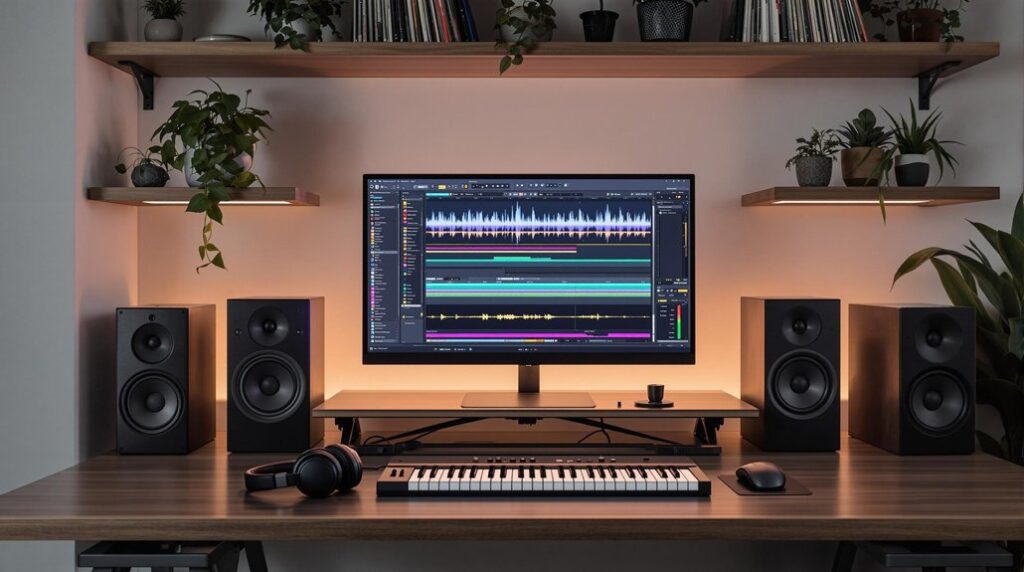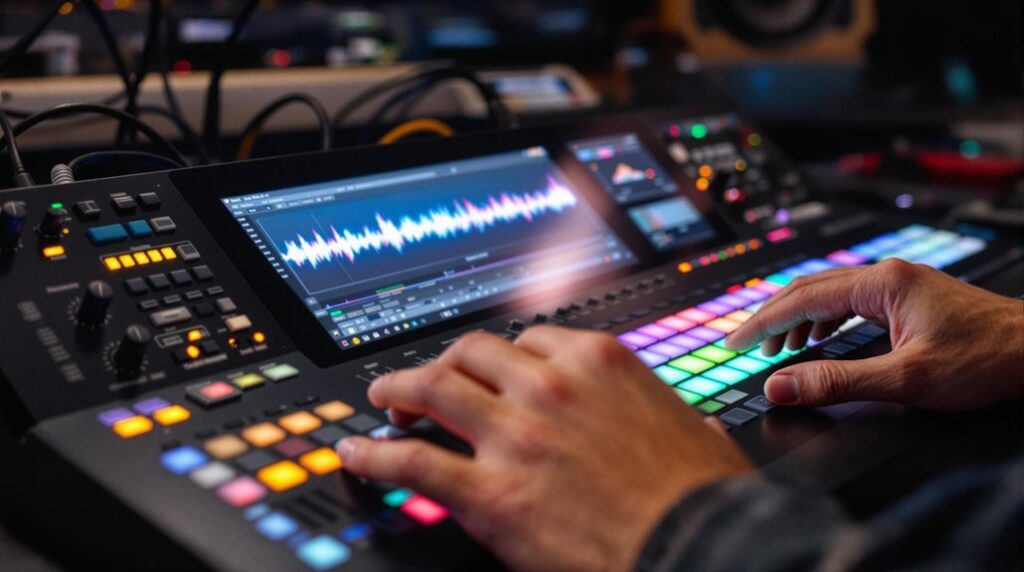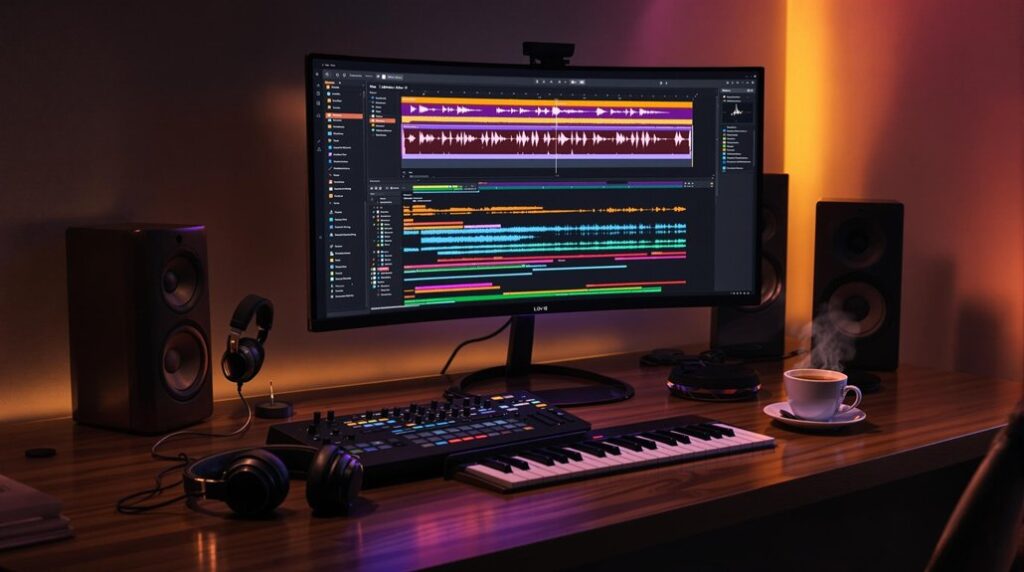A diverse range of DAW software options for Windows cater to specific user needs. Avid Pro Tools is suited for professional-grade recordings with extensive input capabilities. Reaper offers cost-effective customization with thorough plugin support. FL Studio provides a user-friendly interface for electronic music production. Ableton Live excels in live performance and sound design. Adobe Audition is tailored for audio post-production. Understanding these choices will empower users to discover more refined functionalities.
Key Takeaways
- Avid Pro Tools offers professional-grade recording with up to 256 audio inputs and a beginner-friendly free version.
- Steinberg Cubase excels in MIDI editing and is available in versions catering to different user needs.
- Reaper provides extensive plugin support and is cost-effective, with a lightweight design for easy installation.
- FL Studio is popular for electronic music, featuring a user-friendly interface and lifetime free upgrades.
- Ableton Live is ideal for electronic production, with an intuitive session view and collaboration tools.
Overview of DAW Software Options for Windows
In the field of digital audio workstations (DAWs) for Windows, Avid Pro Tools stands out as a quintessential choice for professional-grade recording, offering a subscription model alongside a free version, thereby accommodating both high-end studios and novice users.
Steinberg Cubase delivers a robust toolkit for MIDI editing and audio recording, available from Elements to Pro versions, hence serving a wide spectrum of users.
Reaper provides a highly customizable, cost-effective solution with advanced audio routing, making it attractive for budget-conscious users.
FL Studio, favored by electronic music producers, offers a user-friendly interface with a powerful step sequencer, and lifetime updates.
Bitwig Studio's modular approach to music production software allows extensive flexibility, making it particularly appealing to electronic artists.
Key Features to Consider in a Windows DAW
When selecting a digital audio workstation (DAW) for Windows, compatibility with the operating system and hardware is paramount, guaranteeing seamless integration with existing audio interfaces and MIDI controllers. A DAW's capabilities in multitrack audio recording and MIDI composition are essential for thorough music production. The user interface should support an intuitive workflow, catering to both linear and loop-based production approaches.
| Feature | Consideration |
|---|---|
| Compatibility | Windows OS and hardware support |
| Audio and MIDI Recording | Robust multitrack and sequencing capabilities |
| Plugins and Effects | Built-in and third-party plugin support |
| Performance and Stability | Efficient CPU and memory usage |
Performance and stability are critical, as the DAW must manage complex projects efficiently. Plugins and effects, both built-in and third-party, expand creative potential, while reviews on performance guarantee reliability.
Apple Logic Pro: Compatibility and Functionality
Apple Logic Pro, consistently recognized for its robust suite of features, caters exclusively to macOS users, rendering it incompatible with Windows operating systems.
This DAW requires a modern Mac with OS X v10.13.6 or later, demanding 4GB RAM and 6GB of free space for installation.
Logic Pro excels with its powerful MIDI capabilities, offering a wide array of virtual instruments and advanced audio editing tools. It guarantees seamless project transfers from GarageBand, providing a natural progression for music producers upgrading their toolkit.
The platform's AI-powered tools and extensive sound libraries enhance its appeal, supporting both novice and seasoned producers.
The software's all-encompassing functionality places it as a premier choice for macOS-based audio production environments.
Ableton Live: Best for Electronic Music Production
A multitude of music producers regard Ableton Live as an essential tool in the field of electronic music production, owing to its intuitive workflow and innovative session view.
This Digital Audio Workstation (DAW) is adept at facilitating live performances and sound design, offering a seamless environment for creating dynamic compositions.
The latest version, Live 12, introduces enhanced MIDI tools, allowing for intricate musical arrangements and precise control over electronic elements.
Ableton Live's extensive suite of built-in instruments and effects empowers users to craft complex soundscapes without reliance on external plugins.
The inclusion of collaboration tools, such as Ableton Link, guarantees synchronized tempo across devices, enhancing collaborative ventures.
Additionally, the Push controller offers hands-on interaction, streamlining the music production process.
Avid Pro Tools: Industry Standard for Live Recording
Renowned for its unmatched capability in live recording, Avid Pro Tools stands as the industry benchmark for professional audio production. This software excels by handling up to 256 simultaneous audio inputs, suitable for large-scale sessions.
The Pro Tools Intro version offers beginners access to core functionalities, ensuring seamless upgrades to the full version, which operates on a subscription model starting at $24.92 per month. Its advanced mixing console and customizable shortcuts facilitate a professional workflow, especially for intricate live band recordings.
With ARA 2 support for Melodyne, vocal production is streamlined, providing enhanced editability.
Key Features
- 256 audio inputs: Ideal for complex, live recording environments.
- Advanced mixing console: Customizable for tailored workflows.
- Seamless upgrades: Integration from Pro Tools Intro to full version.
- Vocal production enhancements: Efficient editing with ARA 2 support.
FL Studio: User-Friendly Interface and MIDI Composition
FL Studio stands out for its intuitive step sequencer, streamlining the process of pattern creation for both novice producers and seasoned beatmakers.
Its beginner-friendly interface reduces the learning curve, making it accessible to users without sacrificing powerful features like its advanced piano roll for MIDI composition.
Additionally, the provision of lifetime free upgrades with a single license guarantees that users remain at the cutting edge of music production technology without recurring costs.
Intuitive Step Sequencer
The step sequencer within FL Studio stands out as an essential tool, particularly for electronic music producers and beatmakers, due to its user-centric design and functionality.
This intuitive step sequencer streamlines music production by offering a visually straightforward interface, empowering users to craft intricate rhythms with ease.
Integrated with powerful MIDI capabilities, it enables precise note editing, essential for sophisticated music creation.
Users benefit from lifetime free updates, ensuring access to cutting-edge features that evolve alongside industry needs.
This makes FL Studio a favored choice among DAWs.
Key advantages include:
- User-Centric Design: Simplifies music production for beatmakers.
- Powerful MIDI Integration: Facilitates complex musical arrangements.
- Lifetime Free Updates: Guarantees continual software enhancements.
- Versatile Software Instruments: Supports diverse music styles.
Beginner-Friendly Interface
Building upon the intuitive step sequencer's strengths, FL Studio extends its appeal through a beginner-friendly interface that caters specifically to novice producers. As one of the best DAWs for Windows, its user interface is strategically organized, allowing seamless navigation through music creation tools. The powerful piano roll enhances MIDI compositions, facilitating precise melodic and harmonic arrangements. Novice users benefit from built-in virtual instruments, accessing a diverse array of high-quality sounds integral to the production process. Lifetime free updates guarantee continuous enrichment of skills without extra expenses.
| Feature | Description | Benefit to Beginners |
|---|---|---|
| Intuitive User Interface | Visually organized layout | Easy navigation |
| Powerful Piano Roll | Precision in editing MIDI compositions | Smooth learning curve |
| Built-in Virtual Instruments | Immediate access to diverse sounds | Enhanced music creation |
| Lifetime Free Updates | Continuous feature enhancements | Skill development without extra costs |
Lifetime Free Upgrades
Lifetime free upgrades stand as a significant advantage for FL Studio users, guaranteeing perpetual access to the latest features and improvements without incurring additional costs. This policy distinguishes FL Studio from other software packages, making it a powerful DAW in the competitive domain of music production suites.
Its user-friendly interface simplifies navigation for beginners while retaining the depth necessary for a professional studio environment.
- MIDI Composition: FL Studio's robust MIDI capabilities include an intuitive piano roll, essential for intricate melody and rhythm creation.
- Virtual Instruments: The extensive support for virtual instruments enhances creative possibilities in audio editing.
- Step Sequencer: Ideal for electronic music, it facilitates rapid beat-making and pattern development.
- Software Longevity: Lifetime updates guarantee FL Studio remains a relevant investment for evolving music production needs.
Cockos Reaper: Affordable and Customizable DAW
Cockos Reaper stands out as a cost-effective solution in the DAW market, offering an extensive feature set at a full license price of $225, with an educational discount reducing the cost to $60.
Its highly customizable interface allows users to configure their workspace for maximum workflow efficiency, accommodating a broad range of production requirements.
Additionally, Reaper's lightweight architecture guarantees a swift installation process, while maintaining compatibility with numerous third-party plugins for expanded functionality.
Customizable User Interface
How does one achieve a truly personalized digital audio workstation experience? Cockos Reaper offers a customizable user interface tailored to individual workflow needs. Its low-cost licensing model, with prices as low as $60 for educational users, makes it accessible without compromising on features.
Reaper's audio and MIDI routing options provide flexible mixing capabilities essential for complex setups. The integration of built-in effects and seamless third-party plugins enhances user customization.
Key features include:
- Lightweight and Efficient Design: Optimized for fast loading times and minimal resource consumption, ideal for older hardware.
- Comprehensive Routing: Supports intricate audio and MIDI configurations for personalized mixing.
- Extensive Plugin Support: Built-in and third-party effects expand creative possibilities.
- Affordable Licensing: Cost-effective options without sacrificing functionality.
Cost-Effective Solution
Among the myriad of digital audio workstations available, Reaper stands out as an exceptionally cost-effective solution for audio production.
With its competitive pricing model, Reaper offers both a full license at $225 and a discounted educational license at $60, positioning itself as an affordable option for those on a budget. Users benefit from a free 60-day trial, granting ample opportunity to evaluate its features.
This DAW is highly customizable, allowing for interface and workflow modifications tailored to specific audio production needs. It supports multi-channel audio recording, mixing, and mastering, rivaling more expensive professional DAWs.
Reaper's efficient performance, marked by a small software footprint, guarantees compatibility with a broad range of systems, including older hardware configurations.
Steinberg Cubase: Best for Virtual Instruments and MIDI Editing
Renowned for its exceptional MIDI editing capabilities, Steinberg Cubase stands out as an industry leader in virtual instruments and MIDI manipulation.
This DAW provides an unparalleled music production environment, equipped with a responsive audio engine rated 4.5 stars for its reliability. Ideal for music composition, Cubase's extensive suite of virtual instruments and effects allows composers and producers to craft intricate, layered sounds.
Advanced automation tools offer granular control over the mix, enabling dynamic enhancements throughout the production process.
Cubase is available in multiple editions, such as Elements and Artist, designed to accommodate varying skill levels and budgets without sacrificing essential functionalities.
- MIDI Editing: Precision in fine-tuning MIDI data.
- Audio Engine: Smooth playback and recording.
- Automation Tools: Dynamic mix control.
- Editions: Elements and Artist for diverse needs.
Adobe Audition: Comprehensive Editor for Post-Production
While Steinberg Cubase excels in music composition and MIDI manipulation, Adobe Audition distinguishes itself as a powerhouse for audio post-production.
This thorough audio editing software is engineered for crafting sound effects and managing audio within video projects. Its multitrack editor facilitates seamless mixing of multiple audio sources, vital for enhancing project audio fidelity.
Adobe Audition supports a diverse array of audio formats, allowing for versatile import and export options tailored to specific project requirements. The software's sophisticated noise reduction and audio restoration tools are indispensable for refining recordings and elevating sound clarity.
Adobe Audition's integration with Adobe Premiere Pro guarantees a streamlined workflow, making it an essential tool for professional music producers involved in intricate audio and video post-production processes.
Choosing the Right DAW for Your Music Production Needs
How does one select the ideal DAW for music production on Windows amidst a plethora of options? Evaluating the Best Digital Audio Workstations requires a systematic approach, considering several critical factors.
First, one must ascertain software compatibility with existing hardware and verify support for the selected audio interface for peak performance.
Next, assess whether a professional DAW offers the necessary MIDI capabilities, audio recording features, or live performance focus tailored to specific production needs.
Then, scrutinize the user interface and workflow efficiency, distinguishing between beginner-friendly and advanced functionalities.
Finally, review the pricing structure, noting the inclusion of bundled content like effects and virtual instruments, alongside the option for free trials.
- Compatibility with hardware
- MIDI and audio features
- User interface efficiency
- Pricing and bundled content
Frequently Asked Questions
Which Is the Best DAW for Windows?
Determining the best DAW for Windows involves evaluating flawless performance, intuitive user interface, extensive sound libraries, robust plugin compatibility, workflow efficiency, collaboration tools, competitive price comparison, manageable learning curve, and responsive customer support tailored to user needs.
What Is the Best Music Maker for Windows?
Selecting the best music maker hinges on music production tips and software compatibility issues. For beginners, affordable DAW options with strong MIDI workflow strategies, audio effects plugins, and sound design techniques cater to various music genre preferences and collaborative projects.
What Is the Best Music Editing Software for Windows?
The best music editing software for Windows depends on music production tips, audio mixing techniques, and sound design essentials. Consider plugin recommendations, user interface design, and collaboration tools for workflow optimization, while addressing software compatibility issues and music genre preferences.
What DAW Do Most Professionals Use?
Pro Tools remains popular among professionals for its extensive features, while Ableton Live is noted for live performance capabilities. FL Studio's usability and Cubase's versatility also appeal. Logic Pro, Studio One, and Reaper each offer unique workflows amid evolving digital audio trends.
Conclusion
In evaluating DAWs for Windows, it's essential to align software capabilities with production requirements. Apple Logic Pro's limited compatibility contrasts with Ableton Live's prowess in electronic music. Avid Pro Tools remains a staple for live recording, while Cockos Reaper offers cost-effective customization. Steinberg Cubase excels in MIDI and virtual instruments, and Adobe Audition serves post-production needs. Ultimately, selecting the best DAW involves balancing workflow preferences, budget constraints, and specific audio production demands, ensuring a tailored and efficient creative process.




